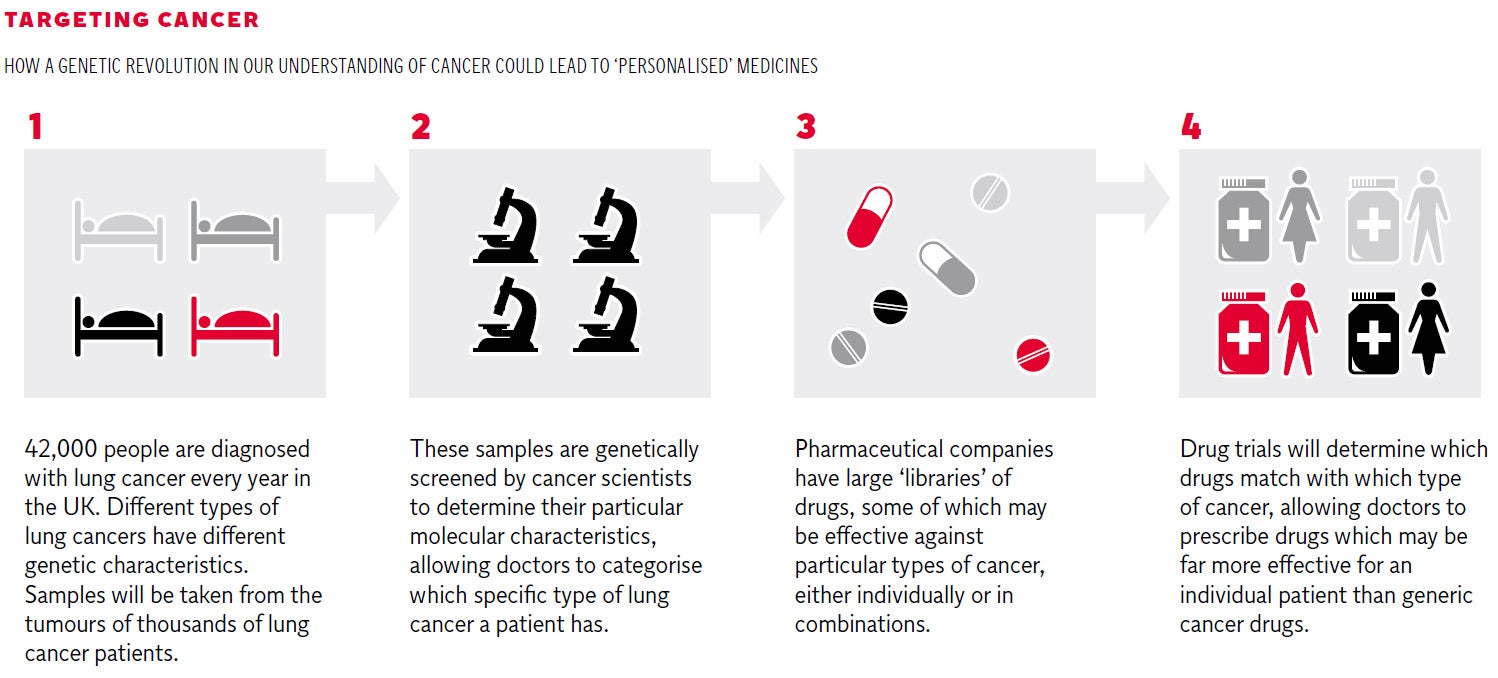Revolutionary genetic drug trial will herald 'new era' in the fight against cancer

A “revolutionary” drug trial aimed at discovering personalised treatments for the UK’s biggest cancer killer will begin this summer, scientists have announced, in an advance which experts say opens up a “new era” in the fight against cancer.
In an unprecedented partnership between cancer researchers, the NHS and the pharmaceutical industry, scientists will exploit a new understanding of the genetic properties of cancer tumours to help them identify drugs to be “targeted” at patients with specific variants of lung cancer.
Click image above to enlarge graphic
Scientists at Cancer Research UK, who have spearheaded the “genetic revolution” in cancer treatment, will be granted special access to the drugs libraries of pharmaceutical giants AstraZeneca and Pfizer from July this year.
Initially, the trials will test the effectiveness of 14 different drugs against 21 different genetic abnormalities identified in the tumours of several hundred lung cancer patients, but it is hoped that drugs which work against the various genetic varieties of every type of cancer may one day be discovered in this way.
The past decade has seen a major shift in our understanding of cancer. New technologies have allowed scientists to undertake detailed genetic analysis of cancer tumours for the first time, revealing the molecular changes that take place when cells transform from a normal part of a healthy body into a cancer cell.
Scientists have been able to identify a wide range of specific abnormalities, and cancers that were previously thought of as one condition have now been revealed to have particular genetic variants in different patients – opening up the potential for much more targeted drug treatments, known as stratified medicine.
The new trials, which will seek new treatments for patients with advanced stage, incurable lung cancer, are among the first of their kind in the world.
Professor Peter Johnson, chief clinician at Cancer Research UK, said that they marked the beginning of “a very exciting time” in the fight against cancer.
“We’ve been talking for a long while now about how the genetic revolution was going to impact cancer care and we’re really starting to bring these things together now,” he said. “We’re very excited about the trial that is going to start, where a number of different cancer drugs targeting these very specific abnormalities will be tested out.”
The trial will look at potential treatments for patients with advanced lung cancer. Small groups of patients will be identified who are likely to benefit from a certain drug. Up to 12 molecules developed by AstraZeneca will be included and two from Pfizer, but it is hoped that other pharmaceutical companies will open up their drugs libraries to cancer trials in the coming years.
Dr Harpal Kumer, Cancer Research UK’s chief executive, said that the trials would “re-write the rulebook”.
“What we’re talking about here is giving a number of options to patients who otherwise would have exhausted their treatment options,” he said. “Importantly it shifts the emphasis of designing a trial around a single drug to designing a trial that selects from a range of drugs, for a specific patient.”
Lung cancer is the biggest cancer killer in the UK for men and the second-biggest for women. There are 42,000 diagnoses every year, and 35,000 people die of the disease. Globally it kills 1.6 million people a year and while rates are declining in men, women have become more susceptible in recent decades because of changes in patterns of smoking.
Dr Kumar said survival rates for the disease had remained stubbornly low, making it a good candidate for these first clinical applications of scientists’ new genetic understanding of cancer.
Menelas Pangalos, executive vice president of innovative medicines and early development at AstraZeneca, said that it was “not beyond the realms of possibility”, that the advent of targeted cancer drugs could, within a decade, transform the prospects for patients with certain types of tumour, potentially lengthening survival times dramatically.
“These [drugs] are very exciting molecules produced by our scientists, and one of the challenges we have is how to get these targeted molecules to the right patients in a cost-effective and time-effective way. [Over the next decade] we could start to offer patients a sequence of therapies that could prolong their life and make this more of a chronic illness, rather than an illness that is fatal within months,” he said.
Professor Johnson said he expected that analysing the “molecular landscape” of cancer patients’ tumours from the moment they are diagnosed would become the norm, allowing doctors to prescribe treatments aimed at the specific genetic characteristics of their cancers.
Patients from 18 Cancer Research UK centres, attached to NHS hospitals, will take part in the initial trial, which has been hailed as “ground-breaking by the Health Secretary Jeremy Hunt.
“Cancer Research UK’s stratified medicine programme will see top scientists work with industry and the NHS to collaborate on innovative, life-saving research,” Mr Hunt said. “I look forward to the benefits this will bring for cancer patients and their families.”
Subscribe to Independent Premium to bookmark this article
Want to bookmark your favourite articles and stories to read or reference later? Start your Independent Premium subscription today.

Join our commenting forum
Join thought-provoking conversations, follow other Independent readers and see their replies